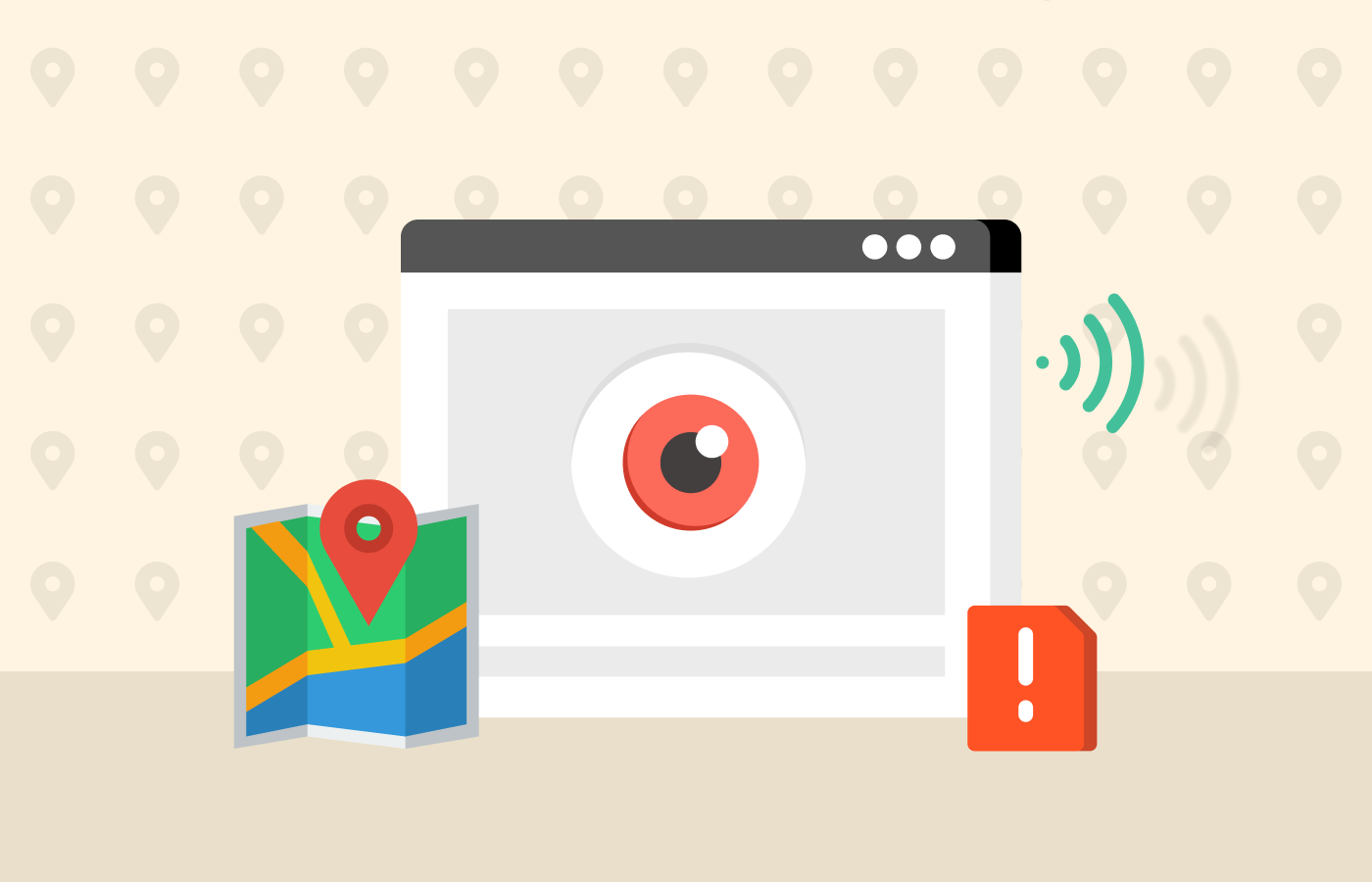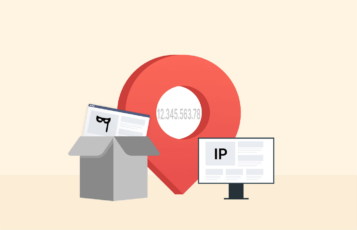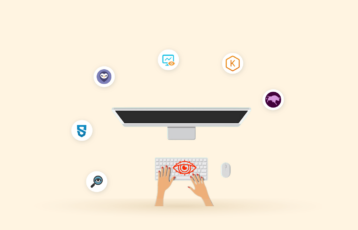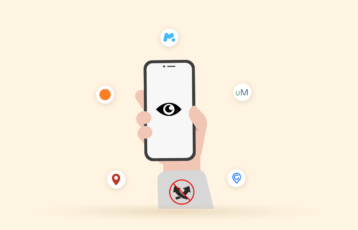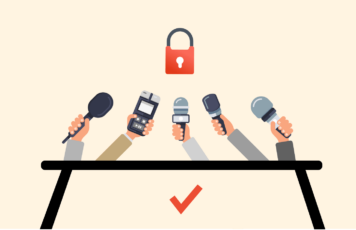Your phone holds almost everything about your life: your messages, photos, banking apps, location, and daily habits. That’s exactly why spyware has become one of the most alarming digital threats today.
If someone is spying on your cellphone, they could track where you go, read your private conversations, or even steal sensitive information without you ever noticing. The scary part? Modern spyware is designed to stay hidden.
But there are clear signs you need to look out for and effective steps to shut it down fast. This guide teaches you how to detect whether someone is spying on your device, how to remove intrusive software, and what you can do to prevent future tracking.
- Unusual battery drainage
- Suspicious phone call noises (crackles, beeps, echoes)
- Excessive data usage
- Suspicious text messages (with random symbols/codes)
- Pop-ups (especially warnings or “too good to be true” offers)
- Phone performance slows down
- Enabled “install unknown apps” setting (Android, without your knowledge)
- Presence of Cydia app (on iOS, if you didn’t install it)
- Unexpected reboot
- Suspicious files or folders (you didn’t create)
- Difficulty in shutting down
- Prolonged shutdown duration
- Phone temperature suddenly rising (when idle)
- Sounds when the phone is idle
- Cell phone lighting up on standby
15 signs to tell if your cell phone is being spied
Most folks are being spied on without them even knowing it. However, you can tell when your smartphone is being spied on, and spyware is on the phone.
It requires close attention to your cell phone, its unusual behaviors, and how it responds to commands. Here are 15 easy signs based on our experts’ research to tell if your smartphone is being monitored, tapped, or tracked;
1. Unusual battery drainage
Your phone’s battery will drain faster under resource-intensive activities like streaming, gaming, or web browsing.
Spyware software usually uses a significant amount of battery when active. Therefore, if you notice your battery is draining more quickly under no such activities, it could indicate that you’re under attack.
2. Suspicious phone call noises
When spyware is installed on your phone to eavesdrop on your phone conversations, they usually make weird sounds when you’re on a call. Therefore, never ignore if you hear sounds in the background, such as crackles, beeps, echoes, or white noise.
Sometimes, such noises may result from bad reception, but it’s in your best interest never to take chances. So, ensure that you check such suspicious activity or intrusive apps.
3. Excessive data usage
Spyware is meant to send data from your phone to the hacker’s server, which consumes more data.
Therefore, if you suspect excessive data is being used, it could indicate someone is spying on your cell phone. Always ensure that you track the network usage of your phone regularly.
4. Suspicious text messages
It doesn’t sound good when you receive a random text with symbols or codes.
Such texts could be a result of spyware on your phone. The first rule is to never click on a link in either email or text; ignore such messages — always.
Also, report any spam messages to your mobile phone provider immediately, which is free of charge in most cases.
5. Pop-ups
Perhaps you’ve experienced some random pop-up dialogue.
Some could warn you about malware; when you click on them, they redirect to shady web pages. That could be malware in your phone or a route to set foot into one.
If such pop-ups claim that you’re a winner of something too good to be true, that’s probably it.
6. Phone performance slows down
If your cell phone suddenly becomes too slow without any understandable reason, it might be a good sign that you’re being controlled or monitored.
Therefore, it could be time to check your phone, and always never leave your phone unattended around folks you don’t trust.
7. The enabled setting for apps to download and install outside of the Google Play Store
Another sign that might indicate that you have spyware on your phone is when your Android phone is set to allow downloading and installing apps outside the official Google app store without your consent.
Such a setting could be a sign that there is spyware within your device, and hence, you need to check for any unfamiliar app within your phone.
8. The presence of Cydia
Generally, it is a tough job for anyone (even professional hackers) to infect iOS devices with malware unless jailbroken.
Jailbreaking (iOS) or rooting (Android) is the process of removing software restrictions imposed by the operating system. This gives the user elevated control but also dismantles key security layers (like sandboxing), making the device vastly more vulnerable to spyware.
However, Cydia (a package enabling users to install software packages on any jailbroken device) makes malicious program installation a breeze. Therefore, its presence (if you never downloaded it) could indicate tampering with your device.
9. Unexpected reboot
Does your phone reboot without your command? If such behavior appears, it could indicate that someone is controlling your phone remotely.
Understandably, if someone could have the power to reboot your phone, then there’s too much they can do within your phone.
10. Suspicious files
Another way to know whether you’re being spied on is by checking for suspicious folders or files created on your phone (which you’re sure you didn’t create).
If such folders or files are present on your device, then chances are your phone has spyware software installed on it.
11. Difficulty in shutting down the cell phone
If you start experiencing difficulties when you shut down your cell phone, then it might be the case where your device has been compromised.
What happens is that when spyware gets installed on your phone, it typically runs in the background, meaning spyware can prevent your device from carrying essential functions, such as shutting down completely.
If the cell phone backlight doesn’t switch off, seemingly to a completely black screen, then spyware is probably causing that difficulty.
12. Prolonged shutdown duration
Just like a PC, your cell phone will start by closing all the active processes when you shut it down.
Therefore, if your cell phone takes more time than usual to shut down, it means more time is being taken to cancel the data-transmitting activities of spyware software.
For instance, if you wanted to shut down your phone just after finishing a call or a series of connections and your phone takes a long time, it could result from the software trying to record the newly generated information.
13. Phone temperature suddenly rising
Is your cell phone temperature rising? It’s a normal phenomenon when your phone is on a hard-core gaming session or charging.
However, that should not be the case when your phone is lying idle in your pocket or while performing light tasks.
An increase in temperature could be a sign that your phone is sending data to some other device without you knowing, and that’s why its temperature is increasing.
14. You hear sounds when the phone is idle
Your phone should not make any sound when it’s idle.
If you hear such noises and you’re not using your phone, it could merely mean that a big brother is watching you. Never take anything for granted; that could mean risking your data to third parties.
15. Cell phone lighting up on standby
Another way to tell if your phone is being spied on is when it lights up while on standby. Most folks ignore this sign, and it’s one that you should never overlook.
I think someone is spying on my cell phone. How do I find and remove spyware from my mobile?
Spying has become a common scenario in today’s world of technology. There are several ways in which you can be spied on without having any idea.
So, the most meaningful thing you can do is find out whether spyware has been installed on your cell phone.
But how will you find hidden spyware in cellphones or even remove it? You don’t have to worry. Here’s how to do it;
Solution for Android users
If you have an Android device, you can check for installed spyware by checking your files. All you can do is follow the following steps;
- Get to your phone’s Settings.
- Then go to Additional Settings.
- Click on Application Management, where you’ll need to look for an unusual file you probably didn’t put yourself. Besides, you can search specifically for spy apps with keywords like monitor, stealth, Trojan, and many others.
- If you find one, delete the app.
However, you should be aware that some software may not use their actual names but rather a fake name. Therefore, you must find the right provider to help delete the file.
Alternatively, you can block the apps by adjusting the security settings;
- Got to settings.
- Additional settings.
- Get to safety and privacy.
- Look at the “Unknown sources” section, which restricts installing apps that are not from the Google Play Store.
Solution for iOS users
Unlike Android, iOS devices are significantly harder to get infected with malware unless jailbroken.
Therefore, attackers will want to jailbreak your device to monitor your iOS device by bypassing security and modification restrictions.
While jailbroken iOS devices are ideal for spying software to work at their best, some spy apps still work on non-jailbroken iPhones.
For instance, mSpy is an app available in the App Store that works on a non-jailbroken iPhone and serves best to parents looking to monitor their children.
mSpy can still be installed on your device by anyone with your iCloud account password. Therefore, you need to change your iCloud password frequently.
To ensure that you stay on the top of the list without any suspicion of iOS spyware, ensure that you update the device with the most current updates via iTunes to remove the potential jailbreak and third-party software.
Solution for Windows users
No spy software is available for mobile devices with Windows operating system.
Therefore, if you’re using a Windows cell phone, then you can at least have a pause, for now, from Big Brother.
Last line of defense: Factory reset
Whichever device type you may be using, your last line of defense against spyware is a factory reset.
Resetting your device to factory settings implies that all the third-party apps will be deleted, meaning any spy software will also be removed.
However, if you decide to go that route, create a backup for your contacts, essential files, and photos first.
Factory reset process for Android users
This process may be different on your Android device. So, confirm with your device manufacturer to get more information.
- Open ‘Settings’ on your device.
- Tap ‘System’.
- Click ‘Reset options’.
- Tap ‘Erase all data (factory reset)’.
- Click ‘Reset phone’.
Factory reset for iPhone users
- Open ‘Settings’ on your phone.
- Search for ‘General’.
- Find ‘Reset’.
- Tap ‘Reset All Settings’
- Enter the passcode.
- Click ‘Reset All Settings’. (You’ll be warned that you’ll reset all your settings, and the Apple Pay cards will be removed).
Cell phone spying apps on the market
There are a lot of apps in the market that one can use to spy on your cell phone; some of the popular ones include;
FlexiSpy
FlexiSpy is a common stalker ware in the current market, marketing itself via a slogan: “It takes absolute control of the device, letting you know everything, no matter where you are.”
It can monitor an array of devices, from Android smartphones to PCs. Also, the company can deliver a device that’s already pre-installed with the malware.
FlexiSpy can listen to calls and spy on various apps such as Viber, WhatsApp, and Facebook.
Moreover, it can record Android VoIP calls, exfiltrate content like photos, and intercept emails and text messages.
PhoneSpector
PhoneSpector is another popular spy app that offers “undetectable remote access.”
It’s designed to be used for both Android and iOS handsets. However, they claim that the service is for parents and businesses looking to track the company-owned devices that employees use.
It only requires text or email and an OTA (over-the-air) link to the targeted device; then, the automated system sets up data transfer protocols and necessary information for monitoring the device.
Therefore, you can view the calls, texts, GPS, and many more by logging in to your online account within minutes, and you’re ready.
SpyPhone Android Rec Pro
This is another spyware that claims to give you full control over the functions of a smartphone.
It offers the capability to listen to the background noise of the calls and record them entirely.
Also, it can intercept and send copies of the SMS on the victim’s phone.
mSpy
mSpy is another stalker ware app that markets itself and has found a presence among parents.
For iPhone, mSpy will allow the user to monitor all SMS messages, GPS locations, phone calls, and apps such as WhatsApp and Snapchat. Moreover, it has a keylogger that records each keystroke that’s made on the target device.
That is not all
The list of stalker ware is broad and includes others like Spyera, SpyBubble, MobileTracker, Spyzie, Mobisteath, FoneMonitor, and Android Spy. Most offer similar features and are booming in the current world.
Also, it’s possible that you can be monitored by legitimate software that has been abused.
Whether you turn on the GPS or not, some information recovery apps and services are meant to track a cell phone when it’s stolen or lost, but they can work against you to track your location instead.
Why would someone spy on my phone?
There could be a trillion reasons for spying on someone, from satiating one’s curiosity about your activities to stealing data. For instance, your partner may want to know about your business activities. Or, your love interest may suspect you of cheating, hence deciding to spy on you via your phone. Likewise, your employer may wish to keep an eye on you, or there could be a criminal hacker who’s simply after your money, stealing, which would be the easiest via your bank apps.
In short, you should never consider yourself safe from spying. You never know when you could be on the radar for anyone. What’s important is that you should realize the existence of smartphone spying in today’s digital world, which you need to remain wary of.
How spyware gets installed on the target phone
We can all agree that if stalker ware and spyware cannot get into your phone, you’re free from being tracked. So, how do they get installed on the target phone?
Mostly, the installation is done physically on the target phone to give it all the permission the app needs simultaneously.
However, if physical access is unavailable, it can still be done in other ways.
It’s the same thing all day, just like the cybercriminal tactics, whereby a link or email attachment is sent along with the malicious package.
What about sophisticated spyware like Pegasus?
Pegasus spyware can be hard to detect. Thankfully, you can apply these measures to mitigate the risks of such surveillance.
- Disable FaceTime and iMessage – While these features are enabled by default, they can be avenues for exploitations. Several iMessage and Safari exploits have recently emerged.
- Daily reboots – Most infections seem to be based on zero-day exploits with little persistence. So, rebooting your device can prevent persistence from taking root.
- Use an alternate browser instead of Chrome or Safari – Some exploits don’t work on other browsers like Brave or Firefox.
Moreover, use a trustworthy VPN service, like NordVPN, and install an app that notifies you if your phone has been jailbroken. Some AV apps can help you check.
The apps like mSpy and FlexiSpy are commercially available “stalkerware” that users often use. A tool like Pegasus is “state-sponsored spyware,” which is far more sophisticated, expensive, and uses undiscovered “zero-day” vulnerabilities to infect phones without any user interaction.
Additionally, if you suspect a Pegasus infection, you should use a secondary device, preferably with GrapheneOS, for secure communication.
How to prevent cell phone spying ahead
You probably don’t want your personal information to get into the wrong hands, especially without your consent.
Hence, to ensure that your device is safe from any potential attack or mishap, you should know all the possible ways to prevent cell phone spying before it happens.
Here’s what you have to do;
1. Keep your mobile with you all the time
Most people who wish to spy on you will physically access your phone to install spyware tools.
Therefore, to be safe from such scenarios, ensure you always know where your phone is. Leaving your phone unattended anywhere should not be an option.
2. Connect to public WiFi only with a VPN
Public Wi-Fi is, without a doubt, a free lunch when you want to enjoy your online activities while you’re out and about. Unfortunately, it’s a place where hackers also take advantage of getting into your phone easily.
For instance, a hacker could fake public Wi-Fi, and once you connect your phone, a hacker can access your internet traffic. Therefore, use a reliable VPN such as ExpressVPN when connecting to any public Wi-Fi.
3. Disable the phone’s microphone
Your phone’s microphone can serve as another route to spy on you.
Therefore, you must ensure disabling access to your phone’s microphone. The apps that can access your phone’s microphone can be controlled in your settings.
4. Don’t trust everyone with your phone
Most folks have fallen victim to attacks by trusting people they should not have trusted.
Avoid letting anyone handle your phone because anyone can have bad intentions of installing spy software on your device.
5. Make use of a private web browser
Your browsing activity could be monitored if you don’t use a secure browser.
You don’t want to risk your sensitive data, such as credit card, bank, and social security information, being exposed to online criminals.
Whenever online, ensure you utilize privacy-focused browsers such as DuckDuckGo, Focus, Brave, and Firefox.
6. Up-to-date phone software
Whenever there’s a new software update, update your phone as soon as possible.
It can help kill mobile spyware as the updates are sometimes essential in fixing the security flaws that hackers may exploit.
7. Avoid suspicious links
People are often targeted with links, asking to click on them and win some gifts that are too good to be true, and those are the links you should avoid like the plague.
It is common sense to never click on any link from someone you don’t know. If you badly want to click on those links, then ensure that you use tools like Virus Total to scan the files and links first.
8. Be app-smart
Some apps could be pirated, just looking to collect your personal data.
Not all apps are worth installing, so you should at least read the permissions the app requires you to provide.
Before agreeing to the terms and conditions of any app, take your time and look at them keenly.
9. Bluetooth and Wi-Fi should be off when not in use
Sometimes, you may not connect to a nearby Bluetooth or Wi-Fi willingly. When they are open, they can connect automatically, exposing you to potential attackers and hence installing spyware on your phone.
Therefore, turning off your Bluetooth and Wi-Fi when not in use is always a good practice.
10. Delete apps or any files you’re not aware of
Sometimes, you may realize an app or file exists in your cell phone that you didn’t install.
Most spyware apps and other malicious software appear on your cell phone, like a file or app.
Therefore, you should perform a scheduled device cleaning by deleting all content you forget to install.
11. Limit your phone’s ad tracking and opt out of ads
Some companies and apps may track your phone usage and use your data to target ads your way.
Unfortunately, some may be using that data in the wrong way. You can limit or even opt out of ad tracking.
To opt out of personalizing advertisements (limiting ad tracking) on Android devices, follow the following steps:
- Go to your ‘Settings.‘
- Locate and tap on Google.
- Now, click on Ads.
- Finally, turn ON the ‘Opt out of Ads Personalization‘ option.
If you are an iOS user, you can do the same on your iPad or iPhone by heading to;
- Go to Settings.
- Then Privacy.
- Next, Reset the Advertising Identifier.
- Finally, click on the Reset Identifier when asked (a prompt will come up).
12. Utilize antivirus software
Just like in a computer for preventing malicious software, apps, or code, antivirus software is another significant component of your mobile security. You can also utilize them on your phone to detect spy software and quarantine it before it causes any real damage.
How are Apple and Google protecting iOS and Android devices?
Apple and Google have dealt with malicious apps that avoid security and privacy protections on their respective app stores.
In the past, Google purged seven apps marketed as child and employee trackers from the Play Store. It dismissed the apps for their overreaching features, including access to messages, GPS tracking, contact list theft, and communication exposure. Also, stalkware ads aren’t available on the Play Store. Unfortunately, some apps have circumvented Google’s restrictions.
Google Threat Analysis continually shares findings on new commercial spyware strains and their potential targets.
On the other hand, Apple has removed parental control apps from the App Store, citing privacy-unfriendly functions. In fact, the company has a parental control service known as Screen Time to help parents manage their children’s device usage. Moreover, the company prohibits sideloading – installation of third-party sources.
Recently, Apple announced plans to invest $10 million in research on mitigating state-sponsored spyware.
Do parental control apps qualify as spyware?
The internet is full of inappropriate content and many threats, so parents want to monitor what their children are viewing or who they are interacting with. While parental control apps are helpful to parents, they are designed for surveillance.
However, the biggest contention is the potential for abuse. Parental control apps can be misused, and some even require invasive permissions – compromising not only the children’s but also anyone’s privacy.
Therefore, there is a need to maintain a balance between the right to privacy and the need for protection, which is very difficult. Both Google and Apple offer parental control apps for various devices that limit screen time, restrict web content and app downloads, purchase approvals, etc.
FAQs
Yes, it’s entirely possible – it’s one of the prime reasons someone would want to spy on your phone. Though it’s pretty difficult to spy on WhatsApp messages on an iOS device due to the underlying sandboxing, on Android devices, that’s trivial.
Installing spying software remotely is difficult since most spy tools require touching the target device at least once (for installation). But if somebody hacks your phone account (Google or iCloud), then things become much easier.
While the commonly available spy tools lack this feature, the more sophisticated ones may offer stealth spies. Edward Snowden has also confirmed that the NSA’s spying occurs when the user switches off the phone. That’s because the spy tool induces an idle state on the phone, preventing any calls, messages, and other notifications, making the user believe that the phone is off. But in the background, the malware continues accessing the camera and microphone to spy on the target users.

